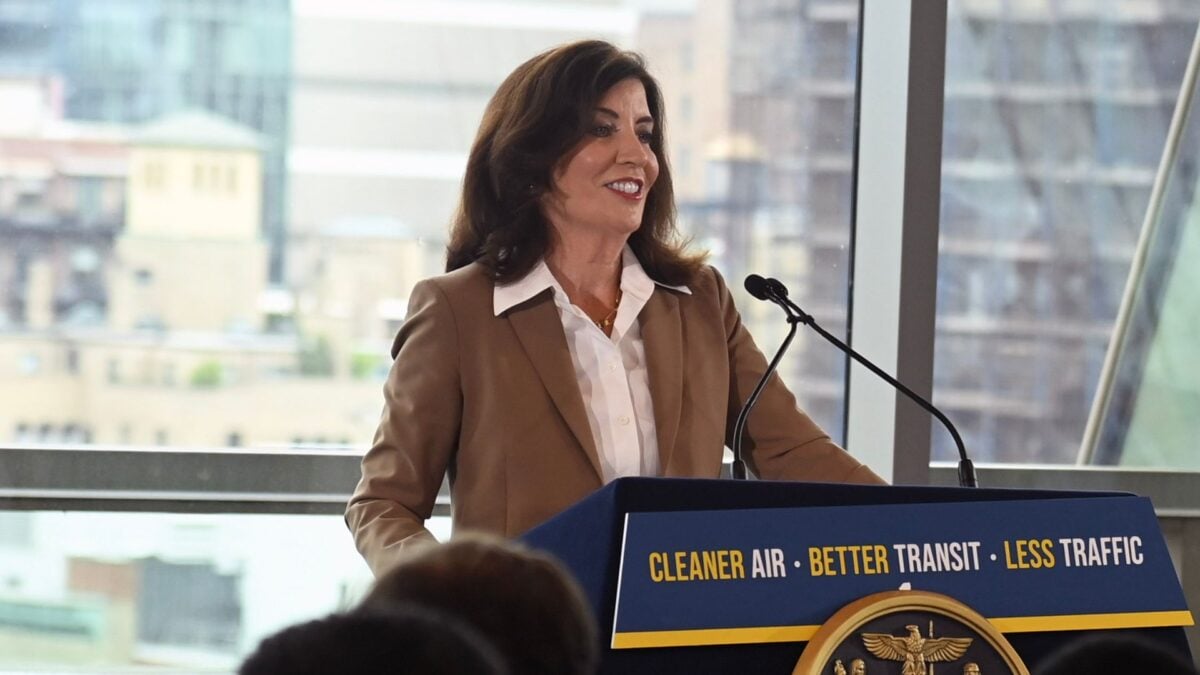New York City’s congestion pricing program may soon come to a halt — at least temporarily. The Department of Transportation rescinded approval of the controversial plan today, according to a letter addressed to New York Governor Kathy Hochul.
The Trump administration leaked the letter to the right-wing tabloid New York Post, which broke news of the decision. However, it remains unclear whether the letter has been formally delivered to the Hochul administration.
The move reflects the intensifying partisanship and unilateralism of the Trump administration. But it’s also smart politics in New York’s purple and red suburbs, where the program is deeply unpopular.
This includes Nassau and Suffolk Counties, which have seen red waves in recent years. Both Nassau and Suffolk voted for Trump in 2024.
Trump Takes Populist Stance Against Congestion Pricing
In the letter to Governor Hochul, Transportation Secretary Sean Duffy criticized the policy as anti-working class, writing, “New York State’s congestion pricing plan is a slap in the face to working-class Americans and small business owners.”
He further argued, “The toll program leaves drivers without any free highway alternative and instead takes more money from working people to pay for a transit system — not highways. It’s backwards and unfair.”
The NYC congestion pricing program charges a toll on vehicles entering Midtown and Lower Manhattan during most of the day. The peak toll is applied from 5:00 AM to 9:00 PM on weekdays and 9:00 AM to 9:00 PM on weekends. For passenger vehicles, the base toll is $9, while small and large trucks are charged higher rates. Ride-share vehicles and taxis pay per-ride flat fees.
NYC Congestion Pricing’s Origins
The idea for the program took root during the 2017 “Summer of Hell,” when New York City’s subway and commuter rail lines faced widespread breakdowns, chronic delays, and overcrowding due to construction and disrepair.
Then-Governor Andrew Cuomo, who is now reportedly mulling a bid for New York City mayor, championed the congestion pricing proposal, which was passed as part of the 2019 New York State budget.
The program aims to generate revenue for the MTA to modernize its fleet and infrastructure while also reducing pollution by encouraging commuters to shift to public transit.
However, some experts have warned that congestion pricing could divert traffic toward toll-free areas and cause greater pollution in low-income areas, such as the South Bronx.
Significant Opposition
Last June, Hochul paused the implementation of congestion pricing at the last minute to help down-ballot Democratic candidates. The program was revived just days after the 2024 elections and went into effect shortly after New Year’s Day.
New York City became the first in the United States to adopt congestion pricing, joining London, Milan, Stockholm, and Singapore.
To meet its budgetary goals, the MTA is expected to raise congestion pricing tolls in the future. However, the program remains highly controversial in New York City’s suburbs and exurbs, where many residents depend on driving for their commutes.
Republican lawmakers, including Rep. Mike Lawler, who represents Rockland County and is considered a potential challenger to Hochul in the 2026 gubernatorial race, have been vocal opponents of the plan. They argue that the tolls disproportionately affect suburban commuters who lack viable public transit alternatives.
According to a Siena College poll in December, 60 percent of those polled in New York City’s suburbs opposed congestion pricing — that includes a 42 percent plurality of Democrats. Opposition to the program was highest among those earning less than $50,000 a year, Latinos, and Republicans.
Like other recent Trump administration moves, this battle will head to the courts.
Janno Lieber, the chair of the Metropolitan Transportation Authority, filed papers in federal court today to oppose the Federal Highway Administration’s termination of approval of the congestion pricing program.
For congestion pricing opponents, the relief may end up being temporary.
Globely News covers the game changers transforming the worlds of business, sports, politics, and technology. From AI and electric vehicles to the rise of China and the NFL's next stars, we've got you covered.



